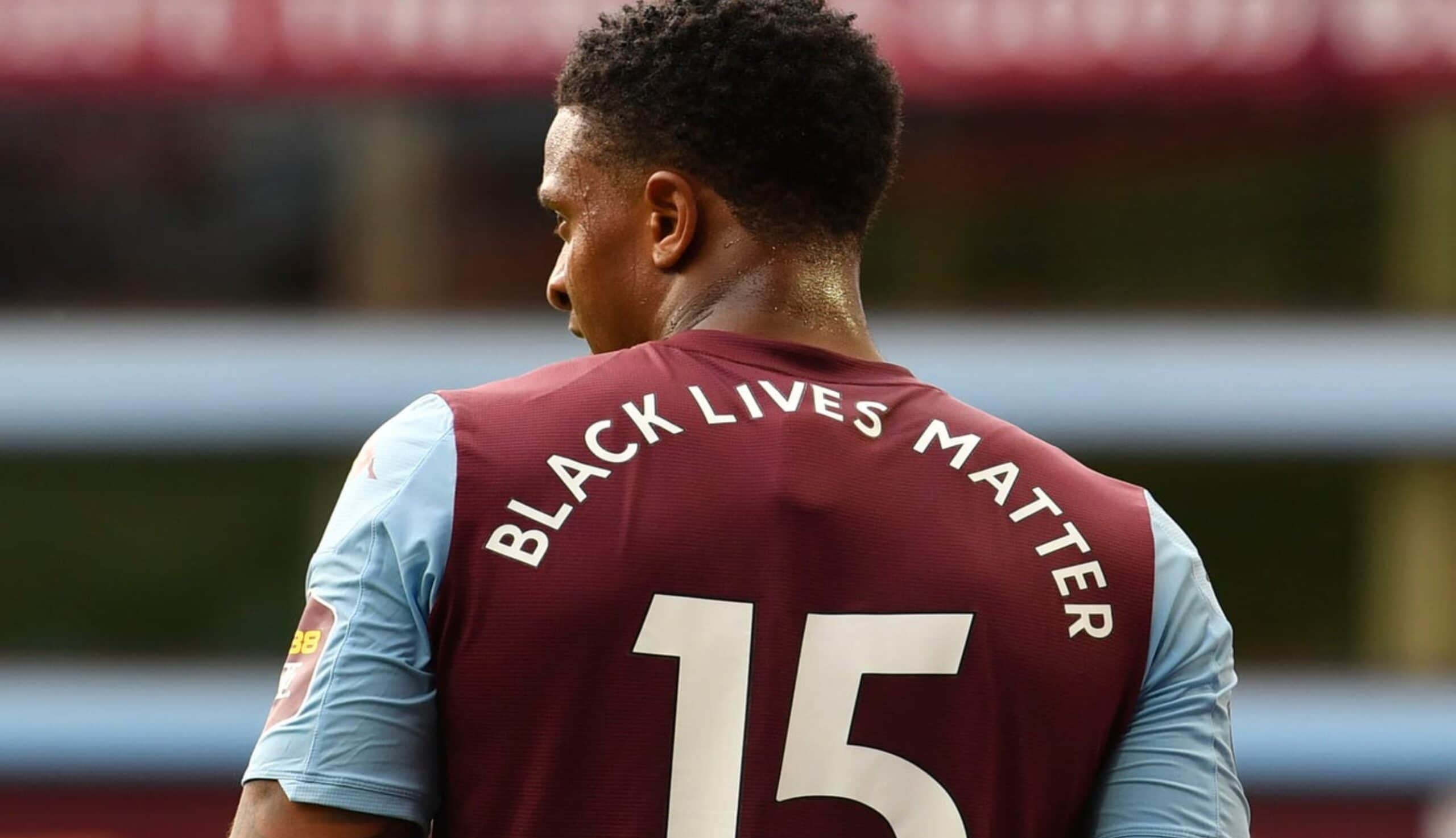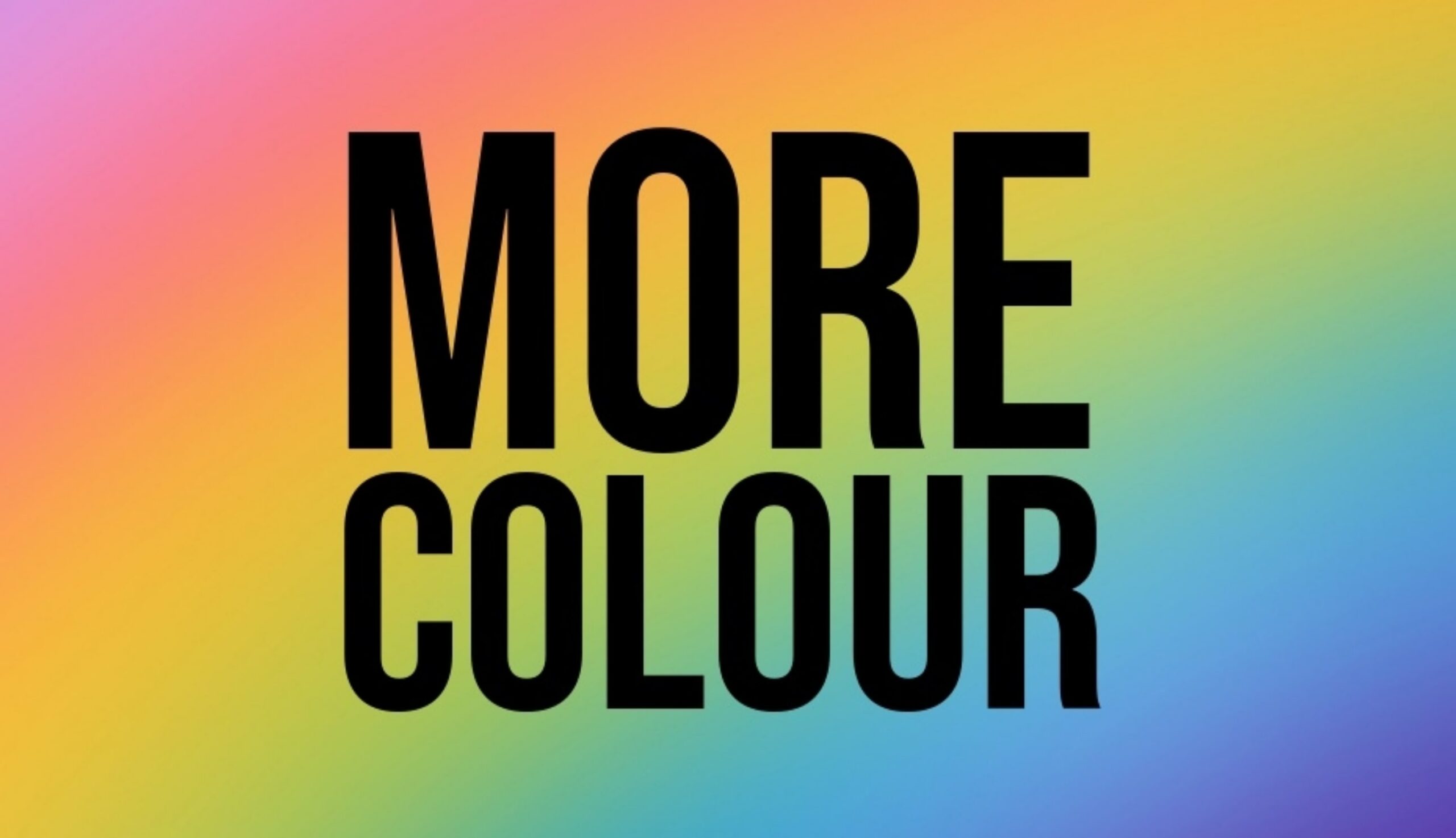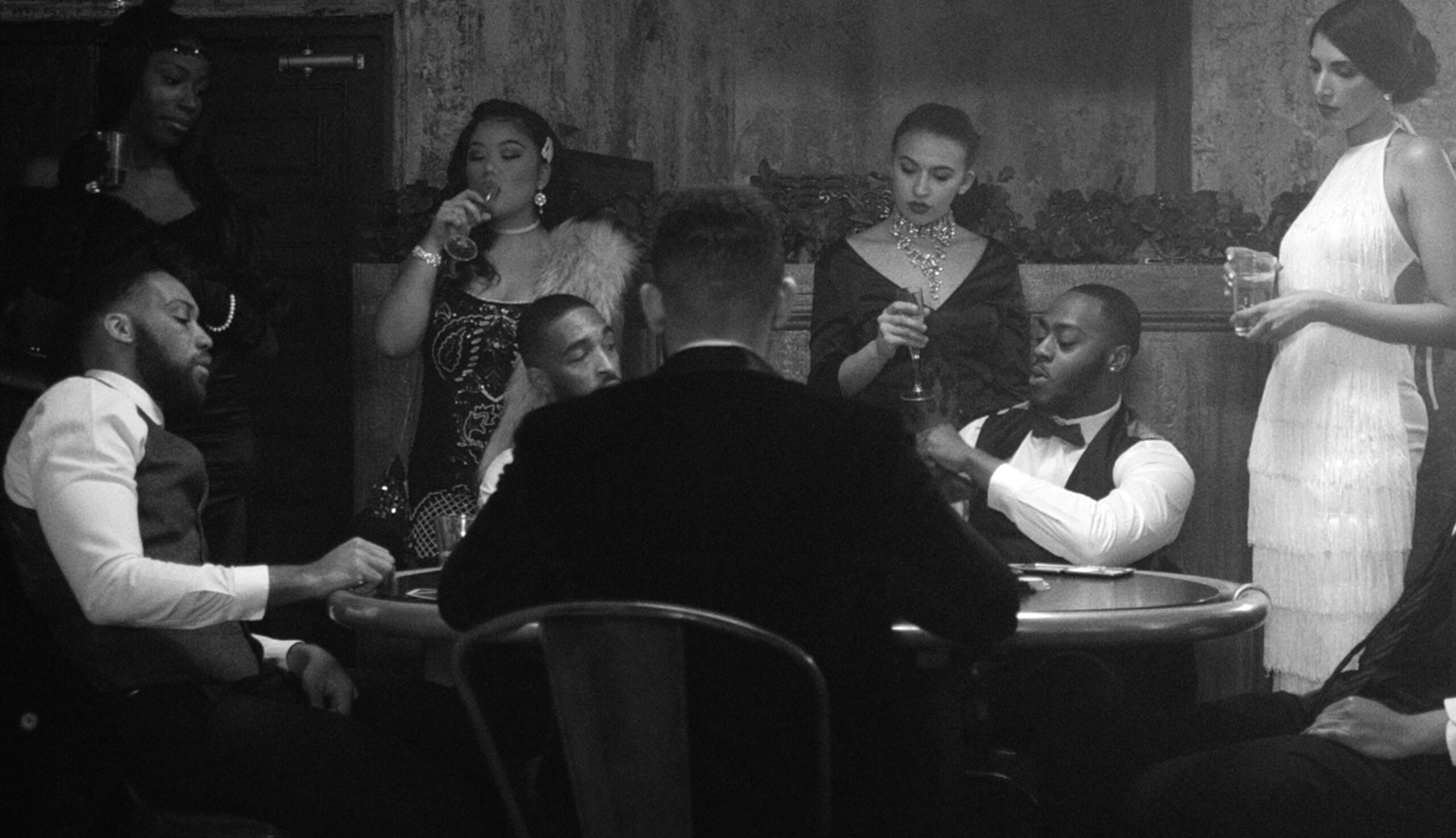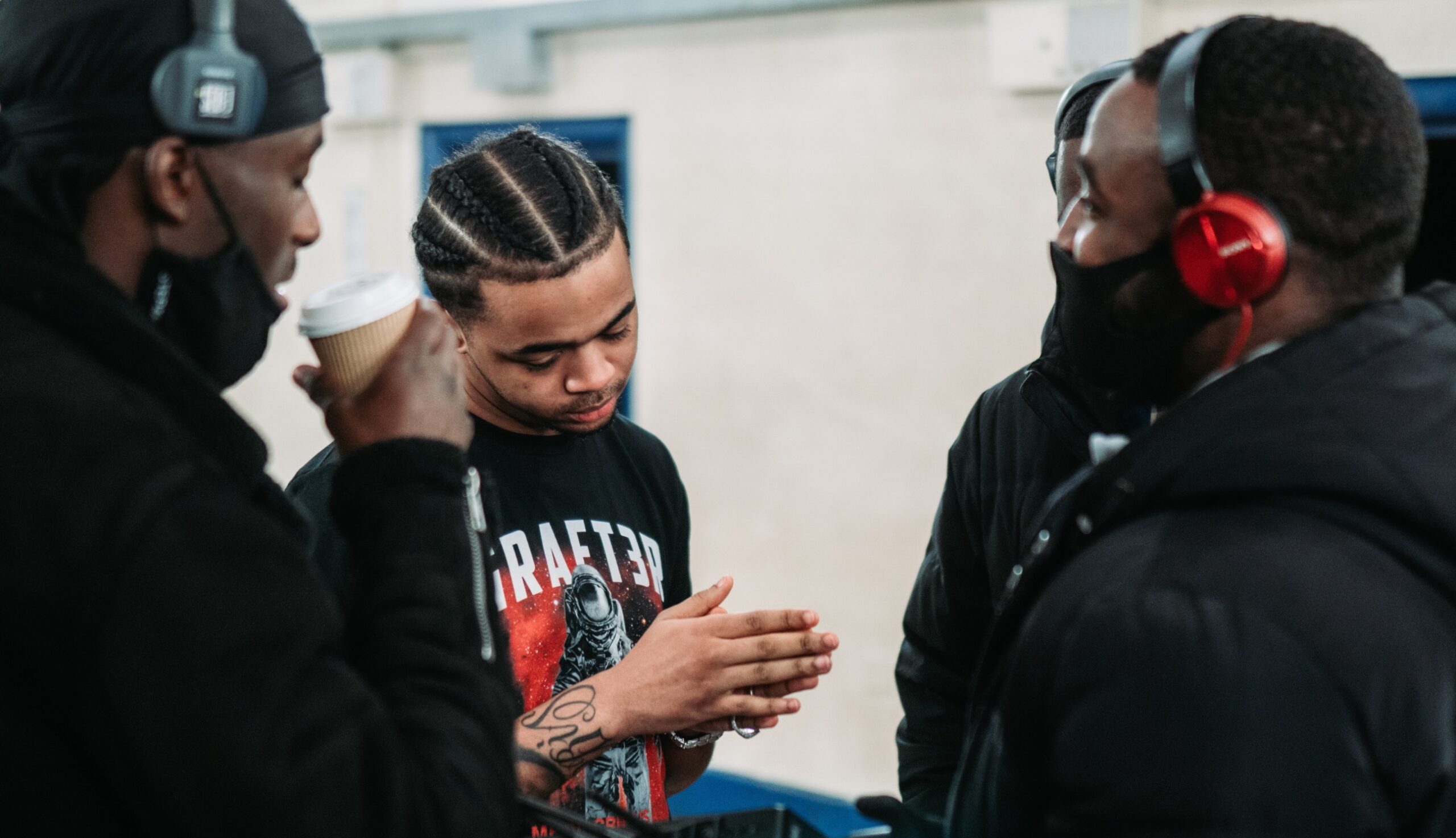
The directors behind Loski’s new short film share their process
We caught up with Dijian Eccles and Andre Reid, directors of Loski’s new short film. Andre works as the music video rep for multi-award-winning production company, Somesuch, while Dijian is the founder of the up-and-coming production company, DMND CLR. They’ve worked together on projects before, but this film marks their biggest collaboration to date. Read the interview below in which they tell us about the process of making Loski’s ‘Music, Trial & Trauma’.
How did this project come your way?
D: A friend of mine, Aaron Reid, hit me up. He said his friend needed a producer for a short film so he put me in contact with his friend. And then Jason Maza, the writer and exec producer, got in touch and explained that they were working on this short for Loski. I was thinking “this is sick, this is sounding good” but I also thought that it might be bigger than me because I was working full-time as well, so I thought let me see what’s possible.
They were also looking for a director so I was like ok cool, I direct, and Andre also directs. Jason told us to send our work over and after that he was just like “yeah that’s dope let’s go for it”. Within a week it went from me just producing to co-producing with Shamara and co-directing with Andre.
A: I’d say less than a week because I remember Dijian hitting me up asking for a reel to send over, and I don’t even know if Jason ended up watching it. But next thing I know, Dijian’s just like “yeah man he’s on it”.
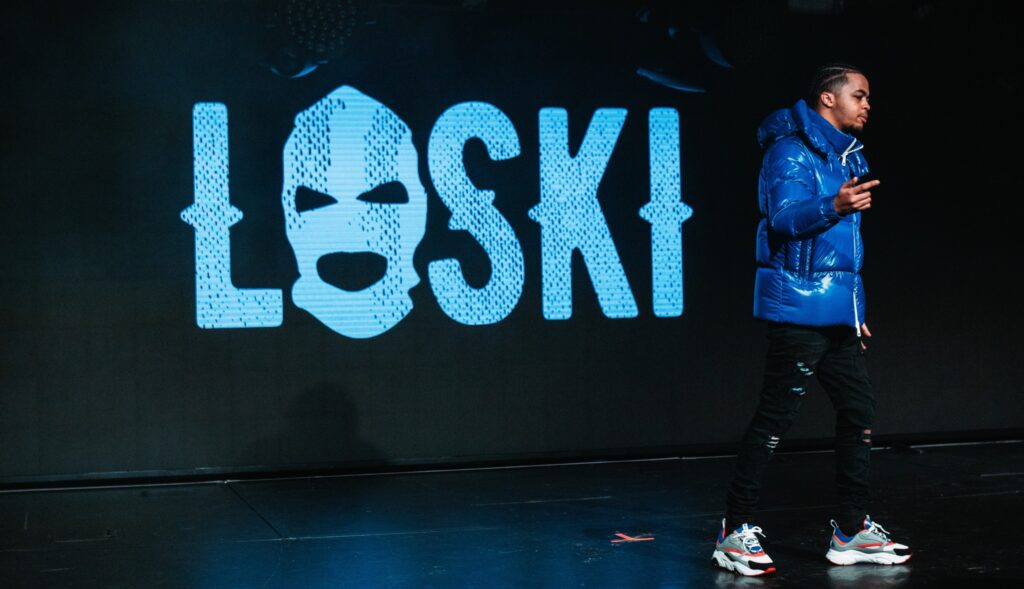
What was it like directing together?
A: We’ve co-directed a music video together before. I think that was the first DMND CLR project that I did. And I was able to get a lot from it because we kinda know each other’s tendencies. We could have actually argued a lot more than we did, but in all fairness we didn’t do too bad.
One shade I will throw is, with Dijian, it’s never good for him to co-produce and co-direct. I remember saying to him, “I’ll give you the producer cap until a certain date in pre-production, but come this later date, I beg you just have your directing cap on” and he was like “yeah man” and all the rest of it.
But if you hear how Dijian speaks he’ll sell the pipe dream with the utmost confidence! Come the shooting days though, I saw how the job was looking and realised this guy’s not gonna do that. We had a couple times on set where I was like “where’s Dijian?” and then got told that Dijian’s having to deal with some producer issue. But that’s my take on it, Dijian might just start ripping me to shreds now…
D: Well where shall I start… I’m joking. Obviously in filmmaking there are times when you’re wearing both hats of producer and director. That’s where the main issue was. Other than that it was pretty straight forward. I feel like Andre would get started on a lot of stuff so that when I came there was something already there. And I do really enjoy working with Andre.
A: One thing I’ll say as well is that Dijian thinks about things that I don’t really care about at times. I’m all about the performance and making sure that the narrative is being told in the best way possible, whereas Dijian’s so technical, man. Especially in post-production as well. When it comes to the grade, this guy is meticulous. My man will see the smallest little things. He goes HAM. So yeah we work well together.
D: Yeah, I think understanding the person and their characteristics is very important and makes the job easier, because sometimes, especially when co-producing, it can be a lot about ego, and I don’t think we really have egos like that.
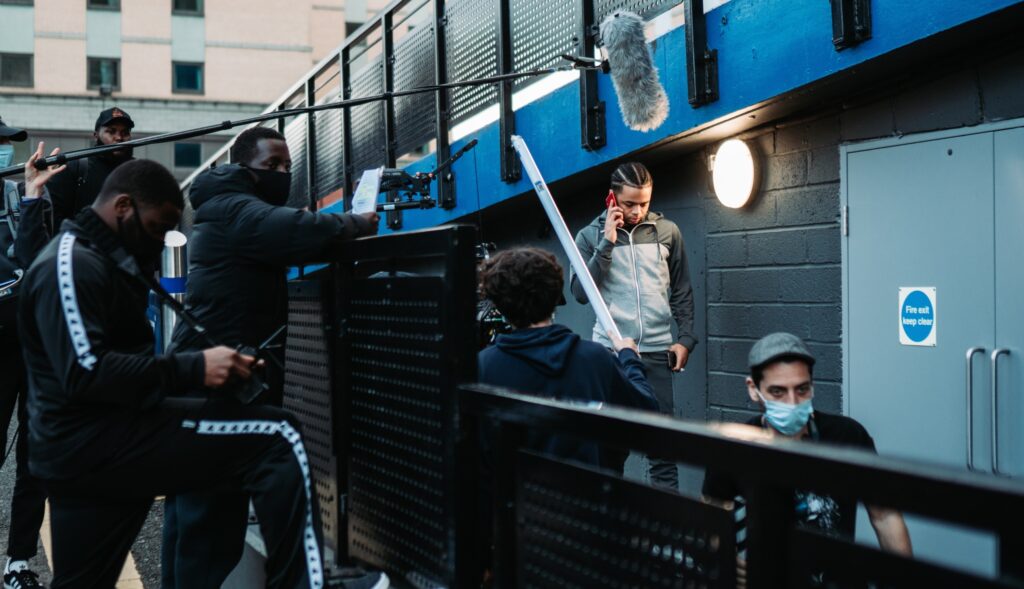
The form of this project was ‘music video meets short film’. What was the process of incorporating so much music into the real-world soundscape like?
D: Before this, I didn’t know much of Loski’s music, but then I did my research when we got the job and realised that there were certain songs of Loski’s that would just bang for particular moments in the film. We did leave it up to the editors quite a lot to select what songs they wanted to put in, but because Andre’s got a good ear for music, and I’d like to say the same for myself, we basically just knew whether a song would work or not.
A: I listened to Loski before this project. Forrest Gump and them ones there. I’m banging them tunes. They’re on my playlist. But when this project came along I was like hold on, there’s a couple tunes that I missed. I heard a couple more tunes where I was like “nah he’s actually cold”.
Certain tracks just felt right. They fit with the mood, they fit with the tension or atmosphere of a particular moment, so I don’t feel like it was ever really a problem for us. I won’t speak for Dijian but this kind of project is my ideal project. I love making movies based off of someone’s music project. When it came to the sound that we picked up on set, we already walked into it saying that we wanted to pick up everything so that we would have a lot to play with, and the sound guys that we had were on point.
When it comes to sound I tell people all the time that it plays a very big part in terms of how we perceive things.
What was Loski like as a collaborator? How much input did he have on the story?
D: Jason and Loski had a phone call and Jason basically just wrote down the crucial things they spoke about and turned that into a script, which we then developed in terms of how we were gonna direct it.
It’s interesting because it’s Loski’s first film project, and he’s a bit more of an introvert than how he comes across on social media where he’s very open. In real life, it took a little while to connect with him due to the fact that he’s come from a hard lifestyle. I think he’s just one of those people that would rather keep to himself as opposed to being the loud guy, which made it a little bit hard to direct him.
A: To add to that, it kind of got established from the first day that he was gonna be playing himself. I feel like if he wasn’t playing himself, he might have felt more comfortable. The fact that he was playing himself meant that we had to work within how he would actually act in certain situations in the film.
This was his first film – obviously he’s done music videos and that, but the repetition of scenes and lines meant that there would be certain moments where he’d be like “bro, I swear we got that?” and I was like “nah we got it in one shot, but now we need to flip the angle”.
So on the first day, we had to make some adjustments but then after that it was calm. For me, it was on the last day where we actually got to see the real Loski because the process had sunk in. If we would’ve got that Loski on the first day, I think we would have got more out of him. I definitely feel like for his next projects, if he does any more films, he’ll give us the Denzel performance.
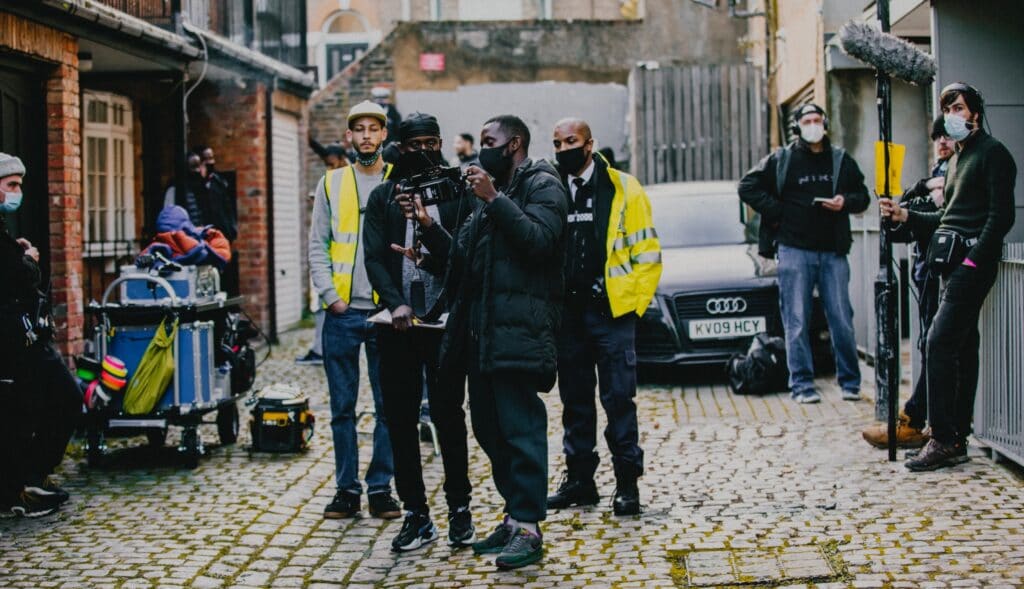
D: We didn’t actually meet him until the first day of filming, when really, we should have had a rehearsal.
A: Yeah we didn’t get to rehearse or get much time to understand him as a person which would have helped us be more effective with him on set. But he was easy to work with and listened to our direction without making a fuss.
It’s important to bear in mind that a lot of the pivotal moments in this film actually happened to him in real life. So, you have to think about the mental factor and the PTSD in terms of the feds running up into the studio… that really happened. I think his performance actually worked out very well in the end in terms of the kind of film it is and the Loski that we were tryna portray. I think it’s genuine. We definitely wanted to keep it very authentic to him.
The acting throughout was sick and seemed very authentic to the environment. Did you cast any non-professionals?
A: There were a few actual actors, but they came from endz in a sense, so they knew exactly what to deliver. Even for those that didn’t, they were just good at acting. For example, the two young boys… they smashed it. Their performance, for me, was just stellar. I was also even able to cast my brother in it. He’s appeared in a Ghetts’ music video and stuff but he’s not an actor. And he smashed it too. People on set thought he was actually an actor.
Even when we saw the casting tapes, we didn’t really care about résumés, it was more about how they looked or came across on camera. If they came across as authentic, it made it easier to direct them, especially if they’d read the script and knew what we were expecting from them. All you’ve really gotta do is paint the scenario. For example, when the boy gets stabbed, we just gave him certain things to imagine and visualise to get a certain reaction. So the casting made our job a lot easier. Hold tight Ola.
D: Yeah, having a casting director at Levile TV made it a lot easier because Jason was very particular about who he wanted in it. But the main actor, Max, had been in TV shows already. Benedict has also done some really good stuff. Jade’s been on a series on Netflix and stuff like that, and then Malcolm has been in Top Boy. We even had Jason acting as Loski’s manager. You might see us in there as well…
A: It’s a sly ting. I didn’t really wanna be in it. It’s funny because I remember after the first take we did, Loski said to us, “show a bit more excitement fam!”. Loski directing us man about our performance? I said “nah I’m not having it”. So we had to step it up in the next couple takes after that.
The scale was mad! A lot of locations, a lot of set-ups, and the story takes place over multiple years. How did you make the process manageable?
A: The team. Hold tight Shamara, the co-producer on this ting. Even Dijian as well. These man were doing overtime. I’m going sleep, and these lot are still messaging each other. I’m waking up, and these lot been messaging each other. I’m thinking, “bro, I just got about six hours sleep here, you man must have been on three or four. If that”. There was a lot of sleepless nights for the production team.
Shamara brought in Sam as well who was the script supervisor and he was pivotal. He was always in our ears being like, “my man needs to be wearing this” or “in the last shot, remember, we had my man doing this”. Hold tight Josh as well, who was the creative director and assisted us every step of the way. At one point, I think we even asked him to take over a scene while we went to speak with Loski. Everyone just stepped up and made the process as effortless as it could be.
D: Yeah definitely the team. Also it was nice to have Jason there guiding us. He really came through as an exec producer.
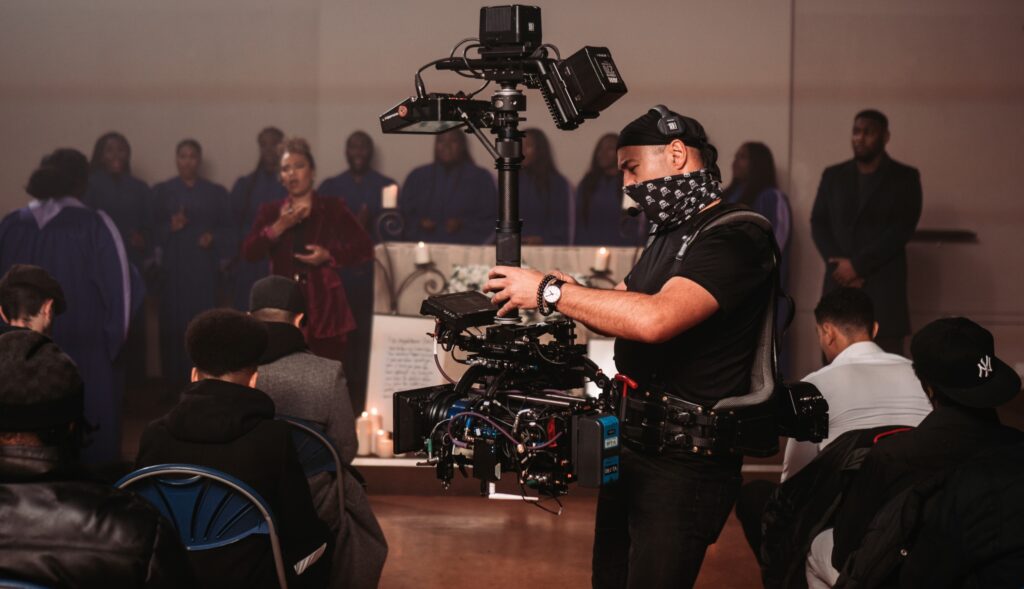
It sounds like there were a lot of challenges to overcome!
A: I feel like the biggest challenge was ensuring that we could even get the job done. We were given one week to prep for the shoot which involved going over the script multiple times, making small amendments, going over the casting, and going over the shooting schedule with Danny the 1st AD. We weren’t even able to do any rehearsals. It was all mental because two days before the shoot, we went into ‘Tier 4’ lockdown, and myself, Dijian and Shamara were all working full-time at the time as well.
What’s the biggest thing you’ve learnt about narrative storytelling from making this film?
D: You’ve gotta have a strong continuity/script supervisor. That was a key lesson. Without that, a lot of mistakes would have been made and you only realise those mistakes when you get into the edit. If you don’t have an overall image of how it’s gonna piece together, you can get lost in it and get into complications. So for narrative I think that’s very important.
A: You might look at it for all kinds of work, but I have to bang on about communication. Having a team that can receive information well without you having to repeat yourself multiple times, and I say that because, especially when you’re pressed for time, repeating yourself continuously is a waste of time that could be used for other things.
D: And off the back of that, when we’re talking about communication, we’re also talking in relation to personal lives. I might have to tell Andre, “I’ve gotta go and do this today” just so that he’s aware, and then he can fill me in on what I’ve missed. That came in handy across the whole team because it’s very easy to miss things, but if you let the team know what’s happening in your personal life, you know what or who needs covering, and that definitely saved this project.
What’s next for you both?
D: This film has definitely inspired me to do more, and has made me a little more confident in storytelling. And now I’m like, let’s just get the ball rolling to do more because, coming from music promos, you don’t really get as much of a chance to tell a story.
A: I just love creating. I definitely wanna be directing more things of this scale. We’re quite fortunate to have come across this opportunity and we grabbed it with both hands. It’s not always gonna be the same for other people, so I probably wouldn’t even mind dabbling in exec producing and putting other people on so they have strong pieces of work to add to their reel.
D: I’d say the ultimate goal together is to create more pieces that tackle real subjects and conversations that haven’t been shown. We wanna push the envelope and show that we can tell other stories.
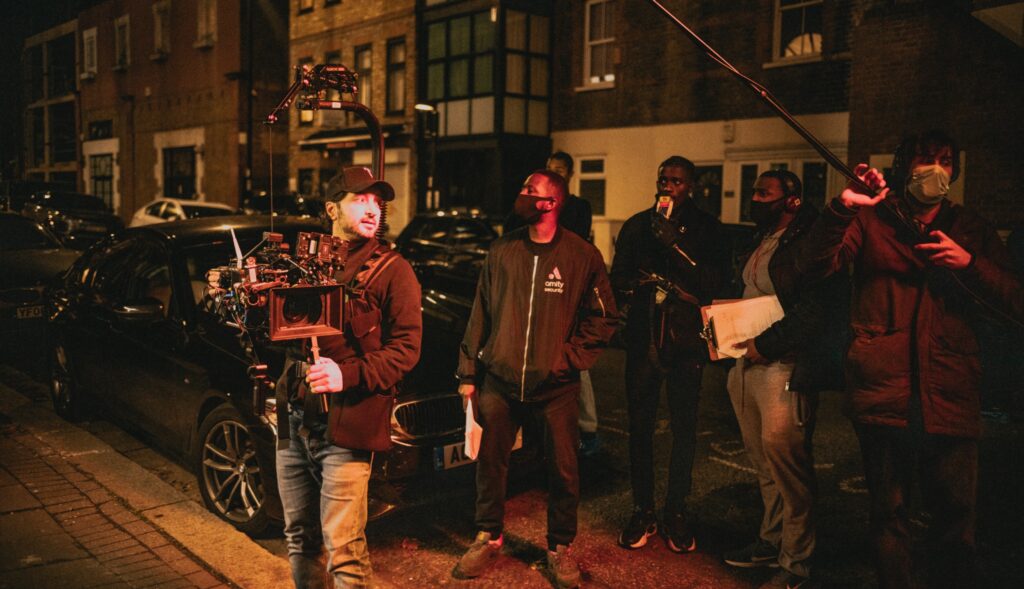
A: We’re tryna push boundaries this year, and I don’t mind if it’s things that are quite testing or push certain people’s buttons. We’ve all got a voice, and especially when it comes to certain pieces of work, who better to tell the story than those who have been through it.
I don’t wanna take shots at anyone, but when people talk about misrepresentation and people telling stories that aren’t theirs to tell, I often say that no-one is stopping us from telling those stories. And if we can tell them stories just as good or probably even better, then why not do it?

